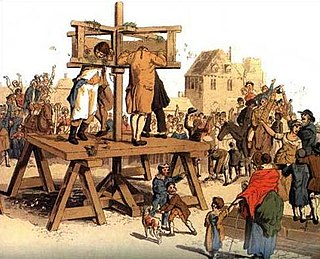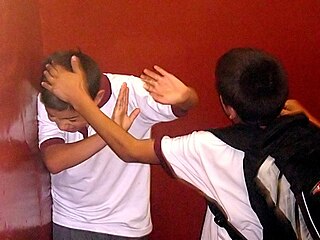 W
WBullying is the use of force, coercion, or threat, to abuse, aggressively dominate or intimidate. The behavior is often repeated and habitual. One essential prerequisite is the perception of an imbalance of physical or social power. This imbalance distinguishes bullying from conflict. Bullying is a subcategory of aggressive behavior characterized by the following three minimum criteria: (1) hostile intent, (2) imbalance of power, and (3) repetition over a period of time. Bullying is the activity of repeated, aggressive behavior intended to hurt another individual, physically, mentally, or emotionally.
 W
WThe Army Foundation College recruit abuse investigation 2014–18 was a response to allegations from a group of 17-year-old British army recruits that 17 instructors had maltreated them during their training over nine days in June 2014. It was reported as the British army's largest ever investigation of abuse. Among the allegations were that the instructors assaulted recruits, smeared cattle dung into their mouths, and held their heads under water. The accused were initially charged with 40 counts of battery, actual bodily harm, and other offences; all denied the charges made against them.
 W
WBackbiting or tale-bearing is to slander someone in their absence — to bite them behind their back. Originally, backbiting referred to an unsporting attack from the rear in the blood sport of bearbaiting.
 W
WThe Bully: A Discussion and Activity Story is a 40-page children's story and activity book by Rita Y. Toews published in 2003. The story focuses on giving children a voice as to how bullying makes them feel, and educates parents on how to handle a bully situation in a positive manner. The book can be used in a classroom, one-on-one with a counsellor or with a parent/caregiver.
 W
WBrodie's Law is an amendment to the Victorian Crimes Act 1958 which makes serious bullying an offence punishable by a maximum penalty of 10 years' imprisonment. The law is named after Brodie Panlock, a 19-year-old who took her own life after being bullied at work. Brodie's parents, Damien and Rae Panlock, successfully lobbied the Victorian Government to make the amendment.
 W
WBullying is the use of force, coercion, or threat, to abuse, aggressively dominate or intimidate. The behavior is often repeated and habitual. One essential prerequisite is the perception of an imbalance of physical or social power. This imbalance distinguishes bullying from conflict. Bullying is a subcategory of aggressive behavior characterized by the following three minimum criteria: (1) hostile intent, (2) imbalance of power, and (3) repetition over a period of time. Bullying is the activity of repeated, aggressive behavior intended to hurt another individual, physically, mentally, or emotionally.
 W
WDehumanization is the denial of full humanness in others and the cruelty and suffering that accompanies it. A practical definition refers to it as the viewing and treatment of other persons as though they lack the mental capacities that are commonly attributed to human beings. In this definition, every act or thought that regards a person as "less than" human is dehumanization.
 W
WEnvy is an emotion which "occurs when a person lacks another's superior quality, achievement, or possession and either desires it or wishes that the other lacked it".
 W
WFagging was a traditional practice in British public schools and also at many other boarding schools, whereby younger pupils were required to act as personal servants to the oldest boys. Although probably originating earlier, the first accounts of fagging appeared in the late seventeenth century. Fagging sometimes involved physical abuse and/or sexual abuse. Although diminishing in its severity over the centuries, the practice of virtual enslavement of junior pupils by their seniors continued in some institutions until the last decades of the 20th century.
 W
WHomosexual agenda is a term introduced by sectors of the Christian religious right as a disparaging way to describe the advocacy of cultural acceptance and normalization of non-heterosexual orientations and relationships. The term refers to efforts to change government policies and laws on LGBT rights-related issues. Additionally, it has been used by social conservatives and others to describe alleged goals of LGBT rights activists, such as recruiting heterosexuals into what conservatives term a "homosexual lifestyle".
 W
WGive a dog a bad name and hang him is an English proverb. Its meaning is that if a person's reputation has been besmirched, then he will suffer difficulty and hardship. A similar proverb is he that has an ill name is half hanged.
 W
WHenkle v. Gregory, 150 F. Supp. 2d 1067, was a federal lawsuit that ended in a 2002 agreement in which the Washoe County School District (Nevada) agreed to implement policies to support openly gay and lesbian students and to pay the plaintiff, a student who had complained of harassment and inaction on the part of school officials, $451,000 in damages. The plaintiff's attorneys called it "the largest pre-trial award of its kind in history".
 W
WHomosexual agenda is a term introduced by sectors of the Christian religious right as a disparaging way to describe the advocacy of cultural acceptance and normalization of non-heterosexual orientations and relationships. The term refers to efforts to change government policies and laws on LGBT rights-related issues. Additionally, it has been used by social conservatives and others to describe alleged goals of LGBT rights activists, such as recruiting heterosexuals into what conservatives term a "homosexual lifestyle".
 W
WHumiliation is the abasement of pride, which creates mortification or leads to a state of being humbled or reduced to lowliness or submission. It is an emotion felt by a person whose social status, either by force or willingly, has just decreased. It can be brought about through intimidation, physical or mental mistreatment or trickery, or by embarrassment if a person is revealed to have committed a socially or legally unacceptable act. Whereas humility can be sought alone as a means to de-emphasize the ego, humiliation must involve other person(s), though not necessarily directly or willingly.
 W
WRichard Dominik Incognito Jr. is an American football offensive guard for the Las Vegas Raiders of the National Football League (NFL). He played college football for the University of Nebraska and was drafted by the St. Louis Rams in the third round of the 2005 NFL Draft. He played for them through the 2009 season, and also played for the Miami Dolphins and Buffalo Bills, making four Pro Bowls. After sitting out the 2018 season, Incognito signed with the Raiders.
 W
WAn insult is an expression or statement which is disrespectful or scornful. Insults may be intentional or accidental. An insult may be factual, but at the same time pejorative, such as the word "inbred".
 W
WIt's All About You is a four-song EP written and produced by singer, songwriter, and Chicago musician Rebecca F.
 W
WMockery or mocking is the act of insulting or making light of a person or other thing, sometimes merely by taunting, but often by making a caricature, purporting to engage in imitation in a way that highlights unflattering characteristics. Mockery can be done in a lighthearted and gentle way, but can also be cruel and hateful, such that it "conjures images of corrosion, deliberate degradation, even subversion; thus, 'to laugh at in contempt, to make sport of' (OED)". Mockery appears to be unique to humans, and serves a number of psychological functions, such as reducing the perceived imbalance of power between authority figures and common people. Examples of mockery can be found in literature and the arts.
 W
WName-calling is a form of verbal abuse in which insulting or demeaning labels are directed at an individual or group. This phenomenon is studied by a variety of academic disciplines such as anthropology, child psychology, and political science. It is also studied by rhetoricians, and a variety of other disciplines that study propaganda techniques and their causes and effects. The technique is most frequently employed within political discourse and school systems, in an attempt to negatively impact their opponent.
 W
WMeredith O'Connor is the Celebrity Youth Activist for the United Nation's NGOCSD-NY; a Radio Hit Recording Artist, and has been deemed an icon in antibullying by The City of Los Angeles, and recognized as such by the United Nations. She has played to packed audiences globally and her hit songs are known by millions around the world. Her music has been featured on Teen Nick and Radio Disney. Her activism for antibullying and mental health is credited with saving and changing the lives of her fans. She has been a leading force in the cause of ending bullying and promoting mental health, recently speaking alongside Charles Schwab, Doris Kearns Goodwin, and Khan Academy's Salman Khan, being recognized as a leader in her industry. She has also been recognized for her work by the United States Congress and the City of Los Angeles. Meredith O'Connor is honored to serve on the Advisory Board of the UN NGO for Sustainable Development, NY. The singer-songwriter, Actress and former Model is currently based in Los Angeles, and New York.
 W
WBullying is the use of force, coercion, or threat, to abuse, aggressively dominate or intimidate. The behavior is often repeated and habitual. One essential prerequisite is the perception of an imbalance of physical or social power. This imbalance distinguishes bullying from conflict. Bullying is a subcategory of aggressive behavior characterized by the following three minimum criteria: (1) hostile intent, (2) imbalance of power, and (3) repetition over a period of time. Bullying is the activity of repeated, aggressive behavior intended to hurt another individual, physically, mentally, or emotionally.
 W
WPhysical abuse is any intentional act causing injury or trauma to another person or animal by way of bodily contact. In most cases, children are the victims of physical abuse, but adults can also be victims, as in cases of domestic violence or workplace aggression. Alternative terms sometimes used include physical assault or physical violence, and may also include sexual abuse. Physical abuse may involve more than one abuser, and more than one victim.
 W
WIñaki Piñuel y Zabala is a Spanish psychologist, essayist, researcher and professor of Organization and Human Resources at the Faculty of Business and Labour Sciences in the University of Alcalá, Madrid. He is an expert in Management and Human Resources and one of the leading European specialists in research and divulgation of mobbing or psychological harassment in the workplace and education.
 W
WA poison pen letter is a letter or note containing unpleasant, abusive, or malicious statements or accusations about the recipient or a third party. It is usually sent anonymously. In the term "poison pen", the word poison is used figuratively, rather than literally. Poison pen letters are usually composed and sent to upset the recipient. They differ from blackmail, which is intended to obtain something from the recipient. In contrast, poison pen letters are purely malicious.
 W
WIn social science and politics, power is the capacity of an individual to influence the actions, beliefs, or conduct (behaviour) of others. The term authority is often used for power that is perceived as legitimate by the social structure.
 W
WBullying is the use of force, coercion, or threat, to abuse, aggressively dominate or intimidate. The behavior is often repeated and habitual. One essential prerequisite is the perception of an imbalance of physical or social power. This imbalance distinguishes bullying from conflict. Bullying is a subcategory of aggressive behavior characterized by the following three minimum criteria: (1) hostile intent, (2) imbalance of power, and (3) repetition over a period of time. Bullying is the activity of repeated, aggressive behavior intended to hurt another individual, physically, mentally, or emotionally.
 W
WPsychological projection is a defense mechanism in which the ego defends itself against unconscious impulses or qualities by denying their existence in themselves by attributing them to others. For example, a bully may project their own feelings of vulnerability onto the target. It incorporates blame shifting and can manifest as shame dumping.
 W
WAn insult is an expression or statement which is disrespectful or scornful. Insults may be intentional or accidental. An insult may be factual, but at the same time pejorative, such as the word "inbred".
 W
WScapegoating is the practice of singling out a person or group for unmerited blame and consequent negative treatment. Scapegoating may be conducted by individuals against individuals, individuals against groups, groups against individuals, and groups against groups.
 W
WSexism is prejudice or discrimination based on a person's sex or gender. Sexism can affect anyone, but it primarily affects women and girls. It has been linked to stereotypes and gender roles, and may include the belief that one sex or gender is intrinsically superior to another. Extreme sexism may foster sexual harassment, rape, and other forms of sexual violence. Gender discrimination may encompass sexism, and is discrimination toward people based on their gender identity or their gender or sex differences. Gender discrimination is especially defined in terms of workplace inequality. It may arise from social or cultural customs and norms.
 W
WSocial exclusion or social marginalisation is the social disadvantage and relegation to the fringe of society. It is a term used widely in Europe and was first used in France. It is used across disciplines including education, sociology, psychology, politics and economics.
 W
WSpanking is a common form of corporal punishment, involving the act of striking the buttocks of another person to cause physical pain, generally with an open hand. More severe forms of spanking, such as switching, paddling, belting, caning, whipping, and birching, involve the use of an object instead of a hand.
 W
WA threat is a communicated intent to inflict harm or loss on another person. Intimidation is widely observed in animal behavior chiefly in order to avoid the unnecessary physical violence that can lead to physical damage or the death of both conflicting parties. A threat is considered an act of coercion.
 W
WA wedgie is the act of forcibly pulling a person's underpants upwards from the back. The act is often performed as a school prank or a form of bullying.
 W
WA whipping boy was a boy educated alongside a prince in early modern Europe, who received corporal punishment for the prince's transgressions in his presence. The prince was not punished himself because his royal status exceeded that of his tutor; seeing a friend punished would provide an equivalent motivation not to repeat the offence. An archaic proverb which captures a similar idea is "to beat a dog before a lion." Whipping was a common punishment of tutors at that time. There is little contemporary evidence for the existence of whipping boys, and evidence that some princes were indeed whipped by their tutors, although Nicholas Orme suggests that nobles might have been beaten less often than other pupils. Some historians regard whipping boys as entirely mythical; others suggest they applied only in the case of a boy king, protected by divine right, and not to mere princes.